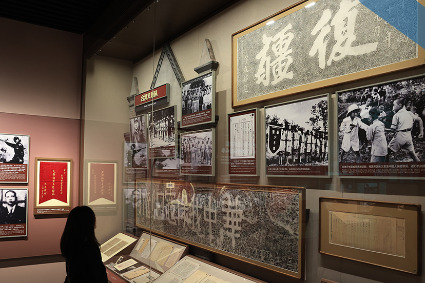Profile: Xi Jinping, the man who leads CPC on new journey


WALKING WITH THE PEOPLE
In September, during an inspection of the village of Gaoxigou in northwestern Shaanxi Province, Xi stopped by farmlands to check the crops and chat with villagers working in the fields. Xi hailed the achievements of local poverty alleviation. Gaoxigou was once an impoverished village; today it is prosperous thanks to the relentless efforts of cadres and villagers.
It was in 1974 in Shaanxi's Liangjiahe, about 150 km from Gaoxigou, that Xi joined the Party. He was just 15 years old when he arrived in Liangjiahe in 1969 as an "educated youth." He would spend the next seven years living in the small village on the rural Loess Plateau; at the end of a day's labor, he would return to his primitive cave house and sleep on a simple clay bed. It would take 38 years and multiple postings across various levels of the Party's hierarchy until he would be elevated to the top job.
After joining the CPC, Xi became Party secretary of Liangjiahe. Shedding light on his caliber, one of his village colleagues said Xi "worked conscientiously, had many ideas and could unite the people and cadres."
Recalling his time in the impoverished village, Xi said what he wanted more than anything was to make it possible for the villagers to "have meat on their plates."
To improve the lives of those who called the community home, Xi initiated various projects, including wells, terraced fields, and methane-generating pits. These "simple" projects would have a significant impact on the villagers' lives, work, and attitudes.
In his spare time, the young Xi devoured as many books as he could. In particular, he read Das Kapital three times; his reflections on the seminal work filled 18 notebooks.
His father, Xi Zhongxun, was among the first generation of CPC central leaders. Xi Jinping often evoked the wisdom imparted to him by the elder Xi. Inspired by a much-loved school book, he decided he would carry on the revolutionary torch from a young age.
In 1975, Xi was admitted to the prestigious Tsinghua University in Beijing. After graduating, he first worked at the general office of the Central Military Commission before moving to Zhengding, a county in northern Hebei Province, in 1982.
Recalling the move to Zhengding, Xi said he had volunteered to work at the grassroots level among the people. He said he wanted to "love the people like he loves his parents."
After Zhengding, Xi's political career took him to the coastal provinces of Fujian and Zhejiang and the metropolis of Shanghai. Wherever he went, his close ties with the people were notable. He wrote heartfelt essays commemorating his deceased friends and colleagues in Zhengding. He used his own money to help finance the medical treatment of a villager from Liangjiahe.
Xi's care for the people can be seen in every aspect of his work. Zhang Hongming, one of his colleagues back in Zhejiang, still remembers Xi's attitude and work ethic when the province was hit by typhoons.
"Even if nine of our ten evacuations are for nothing, we still need to do it to ensure the absolute safety of the people," Zhang said recalling Xi's instructions.
Xi's people-centered philosophy explains why he ordered unwavering efforts to save people's lives at all costs during the COVID-19 epidemic, said Liu Jingbei, a professor at the China Executive Leadership Academy in Pudong, Shanghai.
In 2007, Xi returned to Beijing to sit on the Standing Committee of the Political Bureau of the CPC Central Committee and later became China's vice president. He oversaw areas including Party building, organizational work, Hong Kong and Macao affairs, and preparations for the 2008 Beijing Olympics.
At the age of 59, Xi was elevated to the Party's most senior post in November 2012. About a month later, he braved the winter cold to visit poor villagers in Hebei. Sitting down with them, Xi asked about their income, and if they had sufficient food and enough quilts and coal to stay warm through the winter. Xi said his heart sank when he saw that some villagers were still struggling to make ends meet.
























